
mslearn-ai-fundamentals
Azure AI Fundamentals exercises
Stars: 91
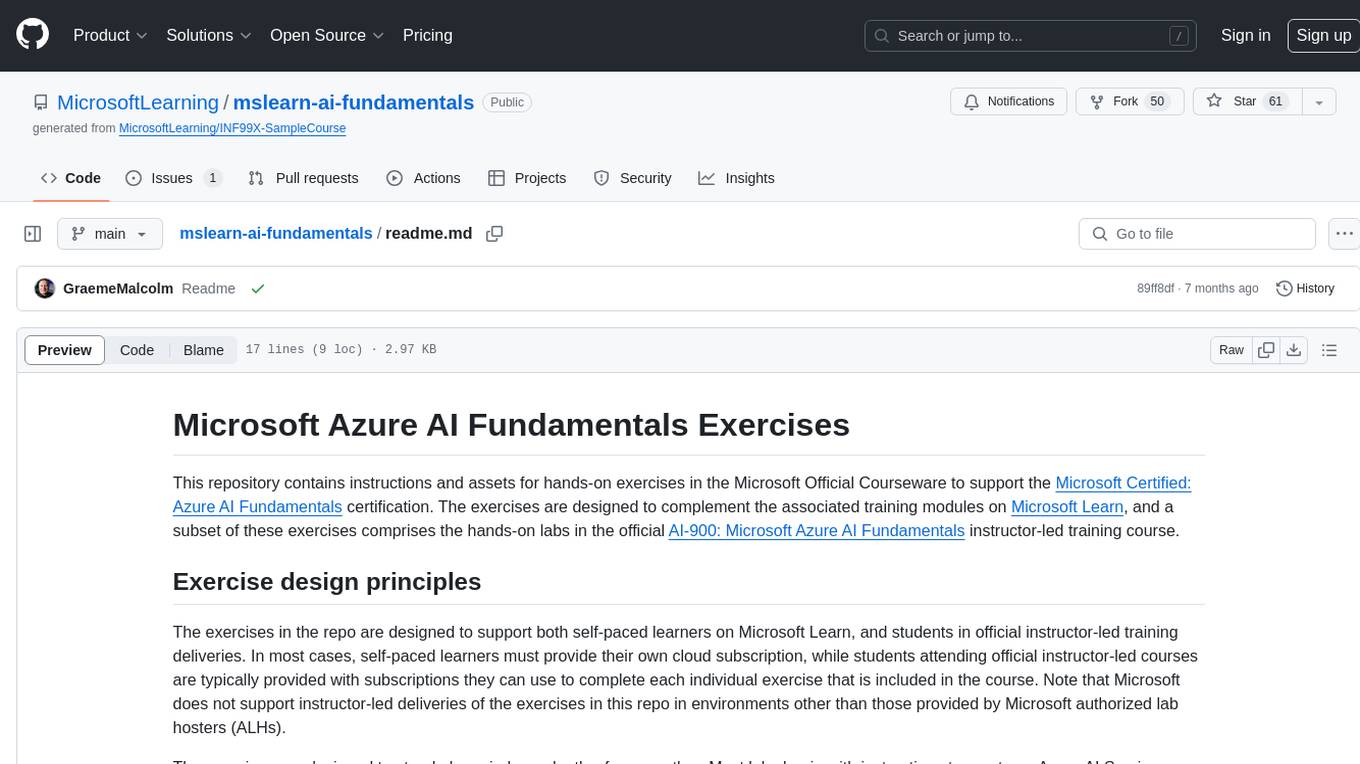
This repository contains materials for the Microsoft Learn AI Fundamentals module. It covers the basics of artificial intelligence, machine learning, and data science. The content includes hands-on labs, interactive learning modules, and assessments to help learners understand key concepts and techniques in AI. Whether you are new to AI or looking to expand your knowledge, this module provides a comprehensive introduction to the fundamentals of AI.
README:
This repository contains instructions and assets for hands-on exercises in the Microsoft Official Courseware to support the Microsoft Certified: Azure AI Fundamentals certification. The exercises are designed to complement the associated training modules on Microsoft Learn, and a subset of these exercises comprises the hands-on labs in the official AI-900: Microsoft Azure AI Fundamentals instructor-led training course.
The exercises in the repo are designed to support both self-paced learners on Microsoft Learn, and students in official instructor-led training deliveries. In most cases, self-paced learners must provide their own cloud subscription, while students attending official instructor-led courses are typically provided with subscriptions they can use to complete each individual exercise that is included in the course. Note that Microsoft does not support instructor-led deliveries of the exercises in this repo in environments other than those provided by Microsoft authorized lab hosters (ALHs).
The exercises are designed to stand alone, independently of one another. Most labs begin with instructions to create an Azure AI Services resource (either a multi-service resource or a specific Azure AI service resource).
The numbering of the exercises in this repo indicates a suggested logical sequence that reflects the flow of modules in the official learning paths and the instructor-led materials. The numbers do not indicate the corresponding slide deck or "lab" in an instructor-led course.
Trainers can use any of the exercises as instructor-led demonstrations at their discretion. Note however that hosted lab profiles and cloud subscriptions may not be provided for exercises that are not included as student labs in courses; and the exercise-specific hosted subscriptions that are provided in lab profiles may have policies applied that prevent completion of other exercises. Trainers are advised to test available lab profiles and to use their own cloud subscriptions for demonstrations if necessary.
Microsoft Certified Trainers (MCTs) are welcome to submit issues and PRs related to content or assets in this repo, subject to the guidance in the GitHub User Guide for MCTs. Trainers should bear in mind that the repo is designed to support self-paced learners on Microsoft Learn as well as students in instructor-led courses, and that some of the exercises in the repo are not included in the hosted lab profiles for classroom delivery. Issues relating to configuration or performance of lab environments provided by ALHs are not supported here - contact your ALH if you experience problems related to the hosted lab environment.
For Tasks:
Click tags to check more tools for each tasksFor Jobs:
Alternative AI tools for mslearn-ai-fundamentals
Similar Open Source Tools

mslearn-ai-fundamentals
This repository contains materials for the Microsoft Learn AI Fundamentals module. It covers the basics of artificial intelligence, machine learning, and data science. The content includes hands-on labs, interactive learning modules, and assessments to help learners understand key concepts and techniques in AI. Whether you are new to AI or looking to expand your knowledge, this module provides a comprehensive introduction to the fundamentals of AI.
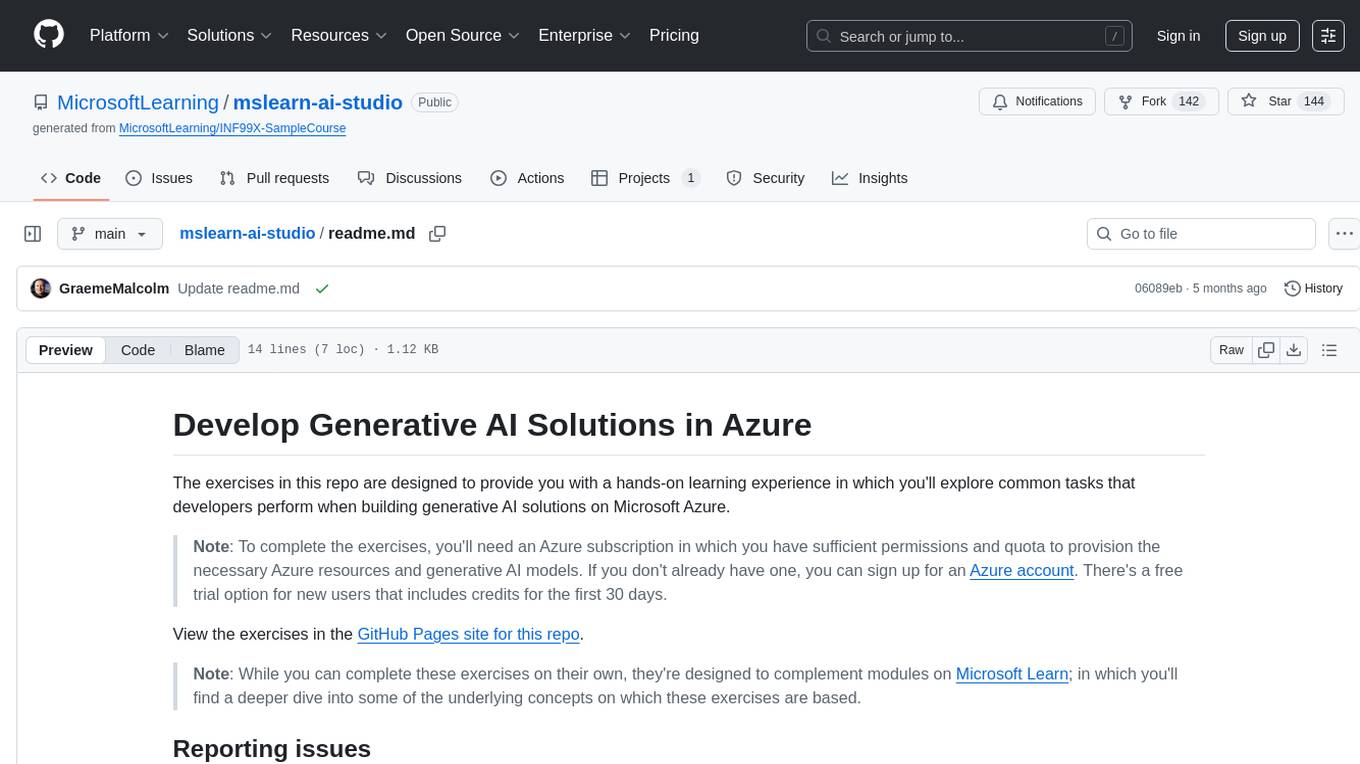
mslearn-ai-studio
The mslearn-ai-studio repository provides hands-on exercises for building generative AI solutions on Microsoft Azure. Users can explore common tasks related to generative AI models and Azure resources. The exercises are designed to complement Microsoft Learn modules and require an Azure subscription for completion.
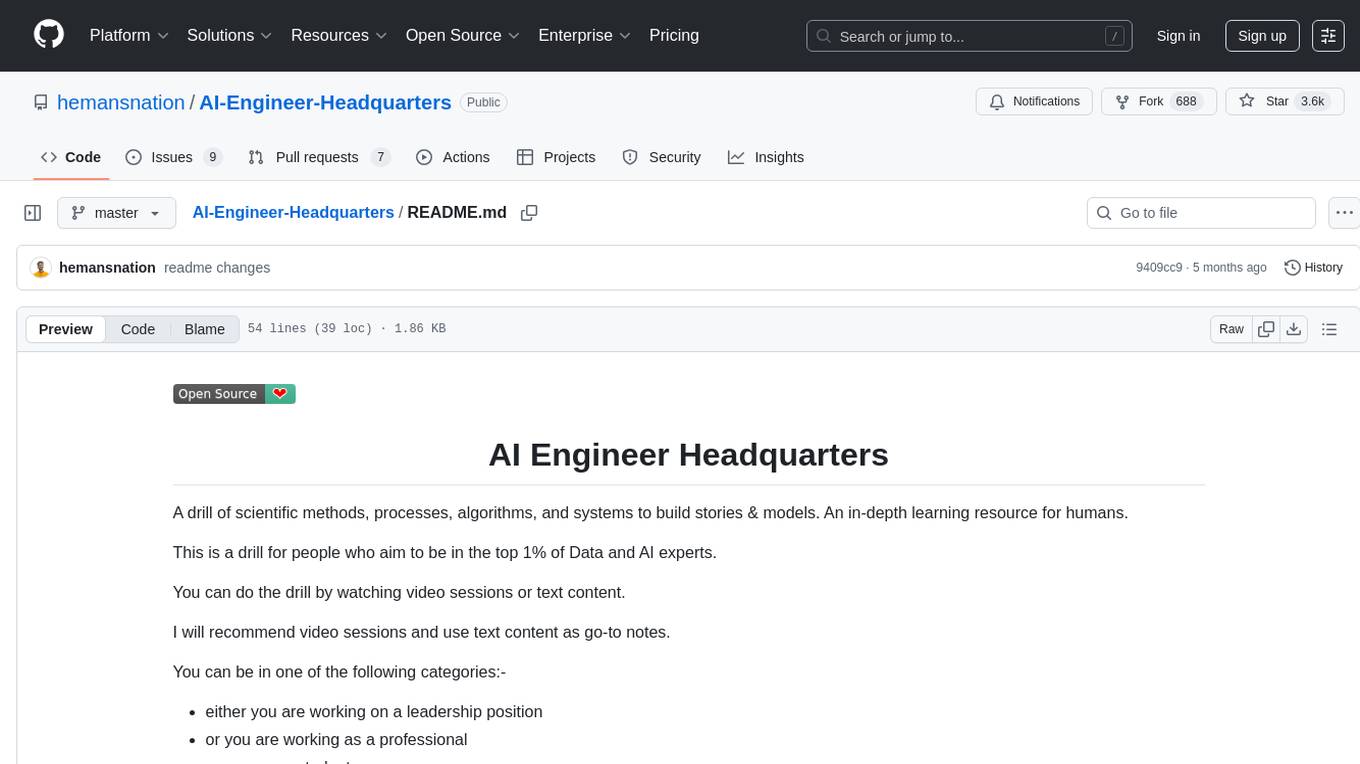
AI-Engineer-Headquarters
AI Engineer Headquarters is a comprehensive learning resource designed to help individuals master scientific methods, processes, algorithms, and systems to build stories and models in the field of Data and AI. The repository provides in-depth content through video sessions and text materials, catering to individuals aspiring to be in the top 1% of Data and AI experts. It covers various topics such as AI engineering foundations, large language models, retrieval-augmented generation, fine-tuning LLMs, reinforcement learning, ethical AI, agentic workflows, and career acceleration. The learning approach emphasizes action-oriented drills and routines, encouraging consistent effort and dedication to excel in the AI field.

Azure-Analytics-and-AI-Engagement
The Azure-Analytics-and-AI-Engagement repository provides packaged Industry Scenario DREAM Demos with ARM templates (Containing a demo web application, Power BI reports, Synapse resources, AML Notebooks etc.) that can be deployed in a customer’s subscription using the CAPE tool within a matter of few hours. Partners can also deploy DREAM Demos in their own subscriptions using DPoC.
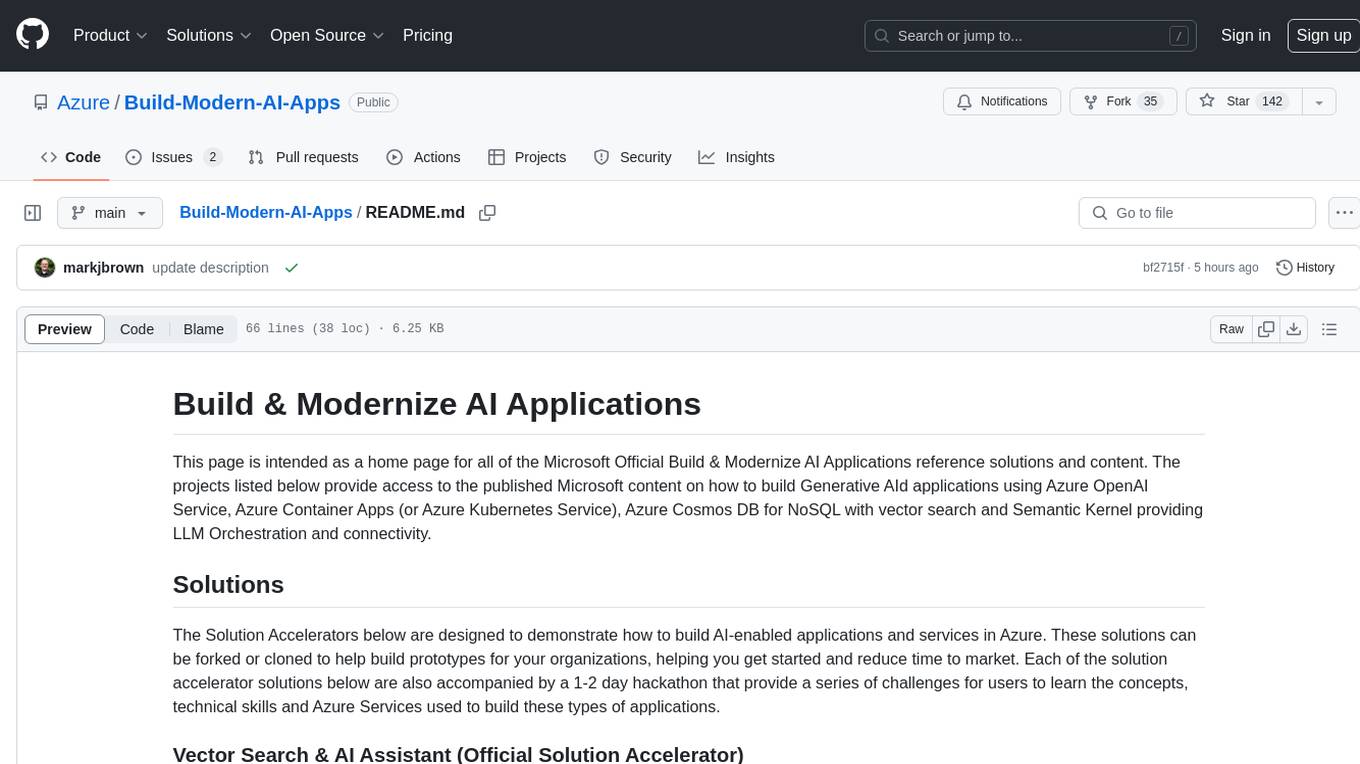
Build-Modern-AI-Apps
This repository serves as a hub for Microsoft Official Build & Modernize AI Applications reference solutions and content. It provides access to projects demonstrating how to build Generative AI applications using Azure services like Azure OpenAI, Azure Container Apps, Azure Kubernetes, and Azure Cosmos DB. The solutions include Vector Search & AI Assistant, Real-Time Payment and Transaction Processing, and Medical Claims Processing. Additionally, there are workshops like the Intelligent App Workshop for Microsoft Copilot Stack, focusing on infusing intelligence into traditional software systems using foundation models and design thinking.
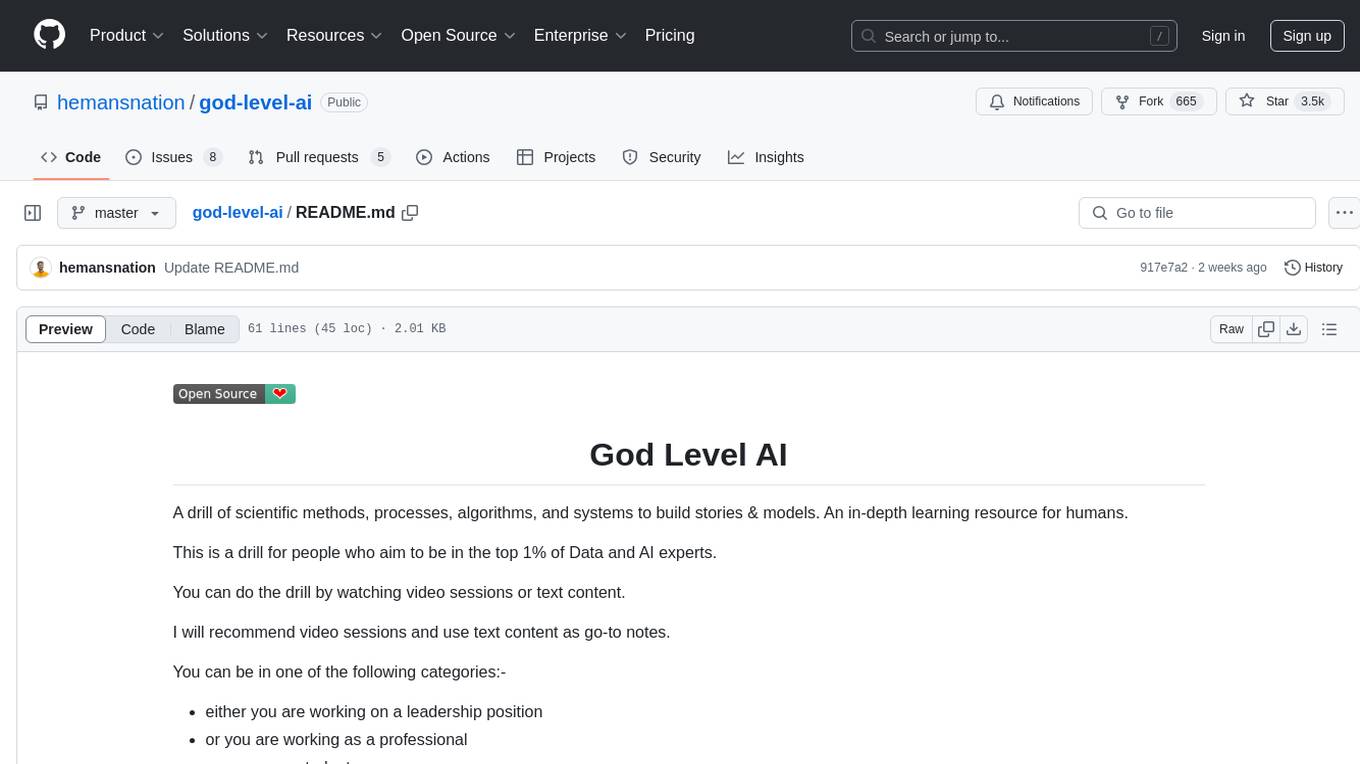
god-level-ai
A drill of scientific methods, processes, algorithms, and systems to build stories & models. An in-depth learning resource for humans. This is a drill for people who aim to be in the top 1% of Data and AI experts. The repository provides a routine for deep and shallow work sessions, covering topics from Python to AI/ML System Design and Personal Branding & Portfolio. It emphasizes the importance of continuous effort and action in the tech field.
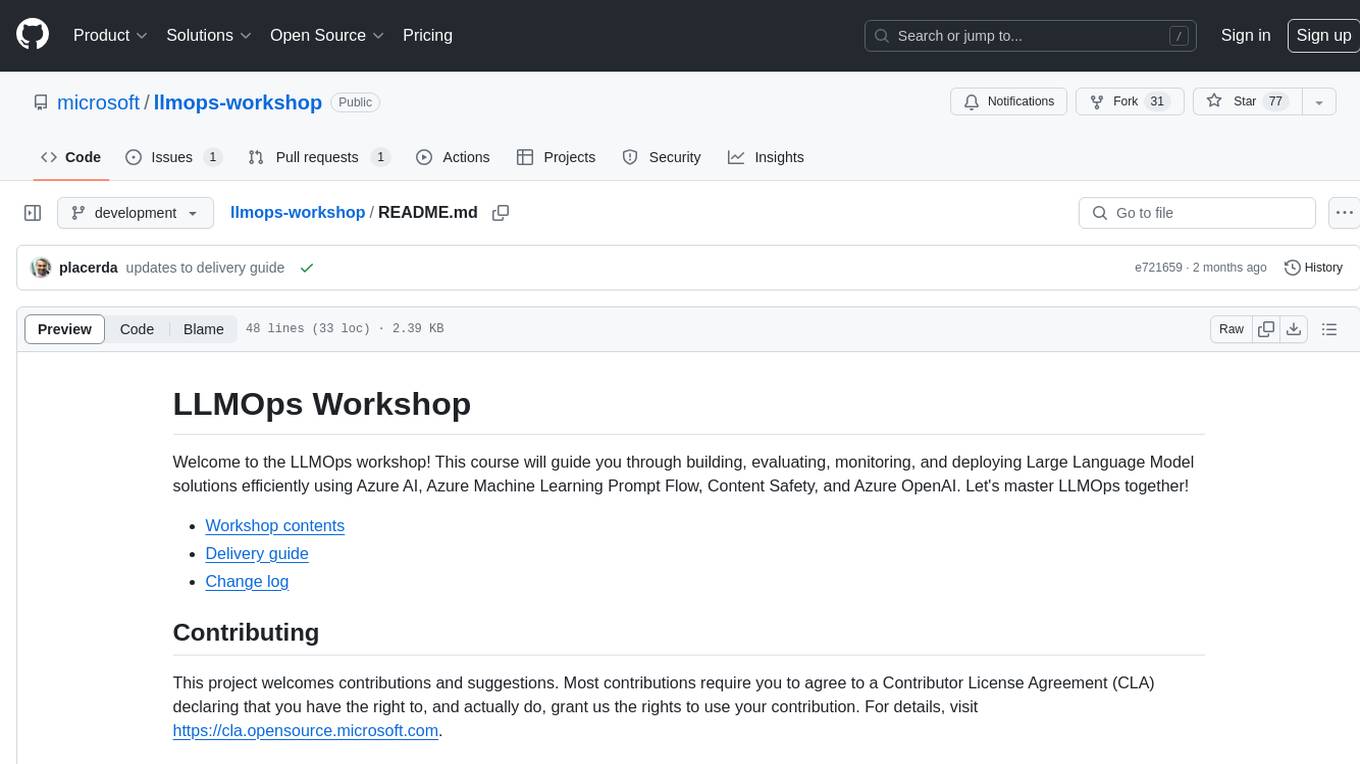
llmops-workshop
LLMOps Workshop is a course designed to help users build, evaluate, monitor, and deploy Large Language Model solutions efficiently using Azure AI, Azure Machine Learning Prompt Flow, Content Safety, and Azure OpenAI. The workshop covers various aspects of LLMOps to help users master the process.
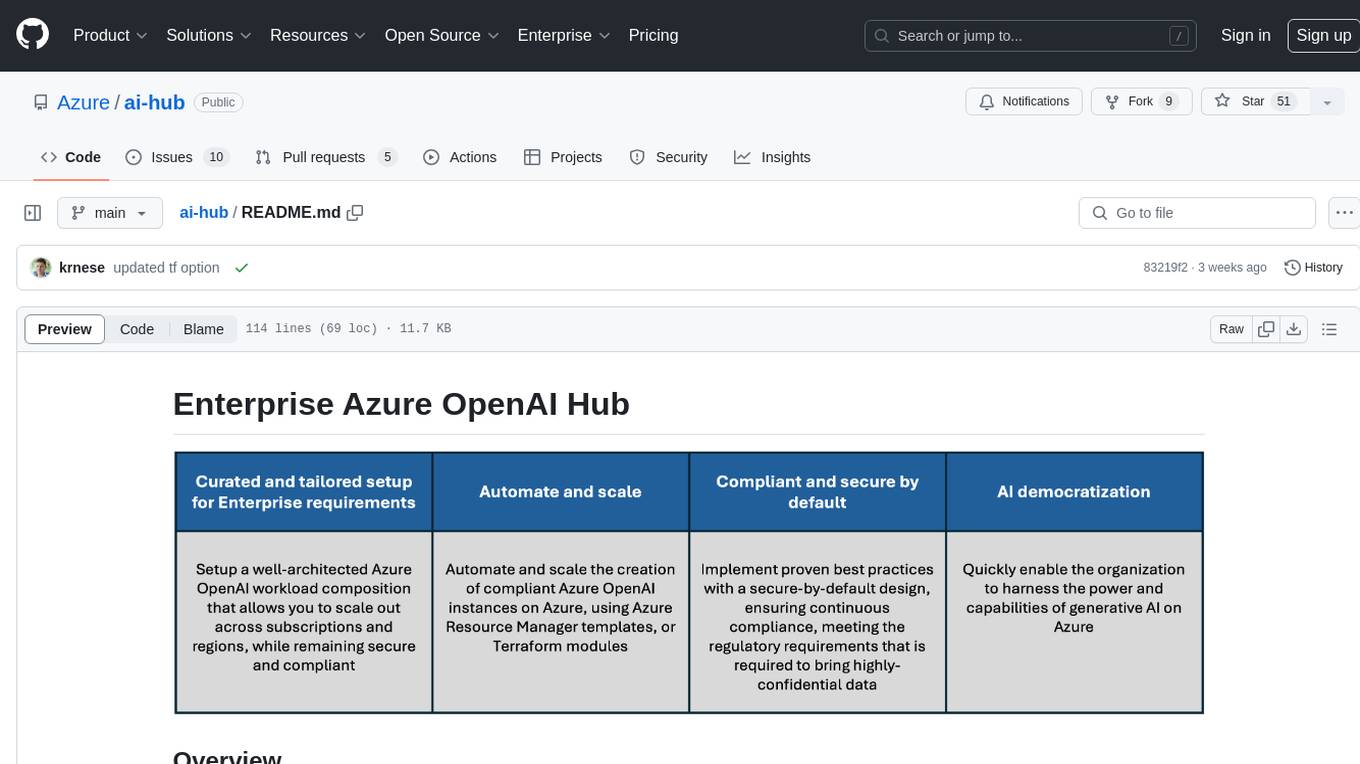
ai-hub
The Enterprise Azure OpenAI Hub is a comprehensive repository designed to guide users through the world of Generative AI on the Azure platform. It offers a structured learning experience to accelerate the transition from concept to production in an Enterprise context. The hub empowers users to explore various use cases with Azure services, ensuring security and compliance. It provides real-world examples and playbooks for practical insights into solving complex problems and developing cutting-edge AI solutions. The repository also serves as a library of proven patterns, aligning with industry standards and promoting best practices for secure and compliant AI development.
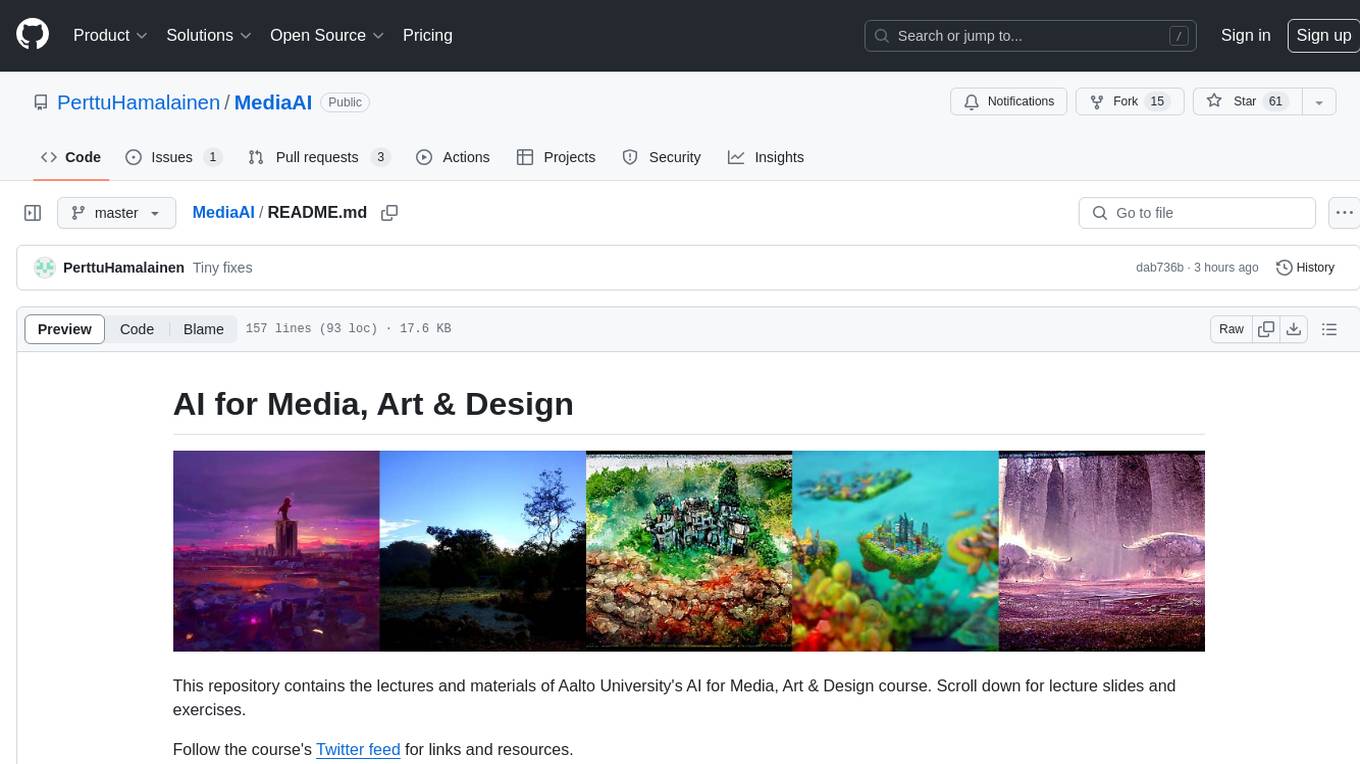
MediaAI
MediaAI is a repository containing lectures and materials for Aalto University's AI for Media, Art & Design course. The course is a hands-on, project-based crash course focusing on deep learning and AI techniques for artists and designers. It covers common AI algorithms & tools, their applications in art, media, and design, and provides hands-on practice in designing, implementing, and using these tools. The course includes lectures, exercises, and a final project based on students' interests. Students can complete the course without programming by creatively utilizing existing tools like ChatGPT and DALL-E. The course emphasizes collaboration, peer-to-peer tutoring, and project-based learning. It covers topics such as text generation, image generation, optimization, and game AI.
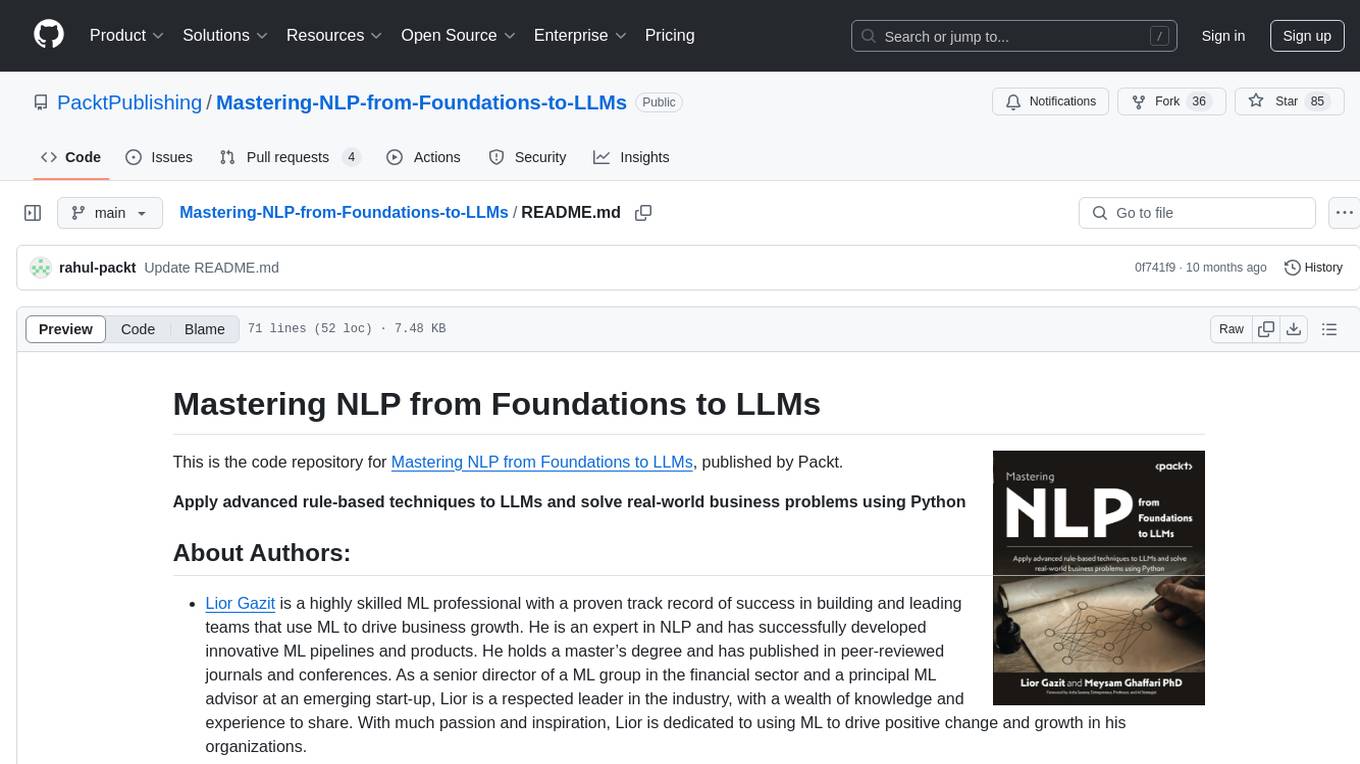
Mastering-NLP-from-Foundations-to-LLMs
This code repository is for the book 'Mastering NLP from Foundations to LLMs', which provides an in-depth introduction to Natural Language Processing (NLP) techniques. It covers mathematical foundations of machine learning, advanced NLP applications such as large language models (LLMs) and AI applications, as well as practical skills for working on real-world NLP business problems. The book includes Python code samples and expert insights into current and future trends in NLP.
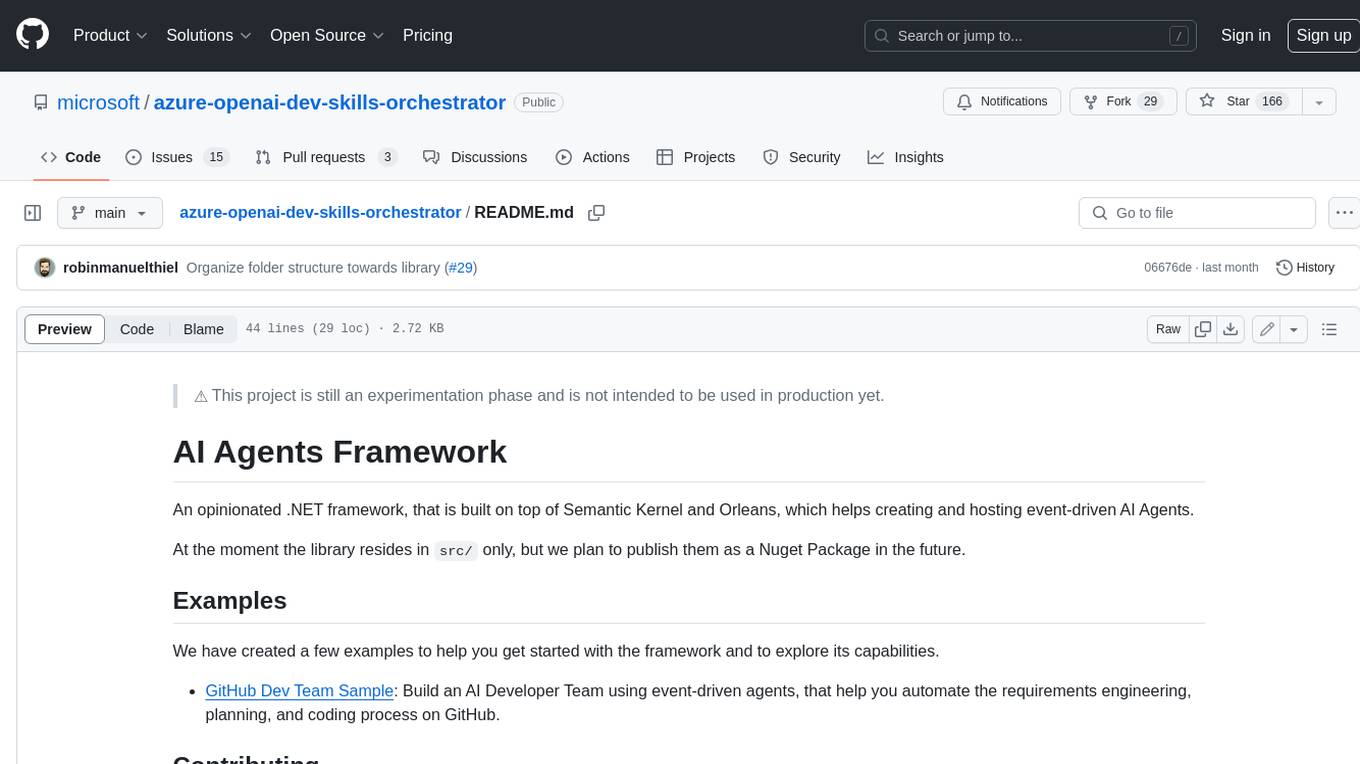
azure-openai-dev-skills-orchestrator
An opinionated .NET framework, that is built on top of Semantic Kernel and Orleans, which helps creating and hosting event-driven AI Agents.
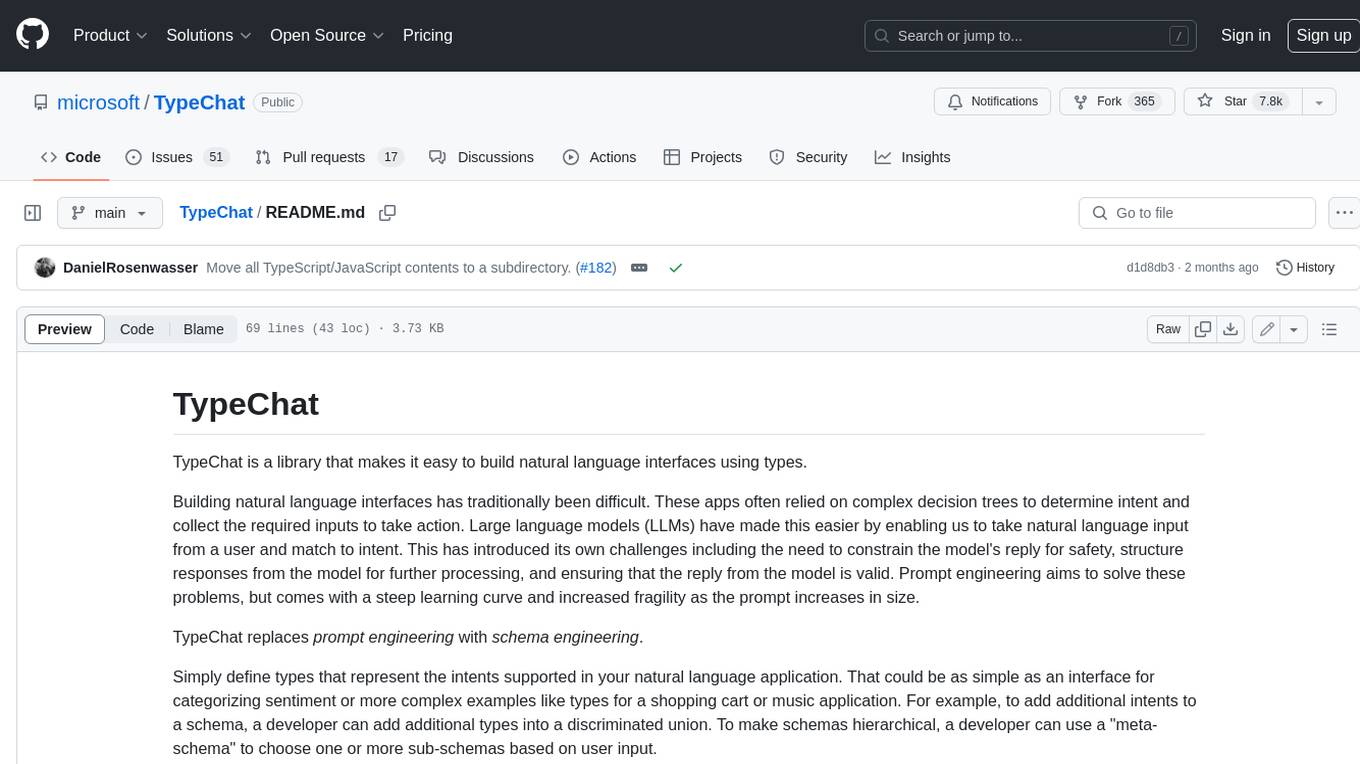
TypeChat
TypeChat is a library that simplifies the creation of natural language interfaces using types. Traditionally, building natural language interfaces has been challenging, often relying on complex decision trees to determine intent and gather necessary inputs for action. Large language models (LLMs) have simplified this process by allowing us to accept natural language input from users and match it to intent. However, this has introduced new challenges, such as the need to constrain the model's response for safety, structure responses from the model for further processing, and ensure the validity of the model's response. Prompt engineering aims to address these issues, but it comes with a steep learning curve and increased fragility as the prompt grows in size.
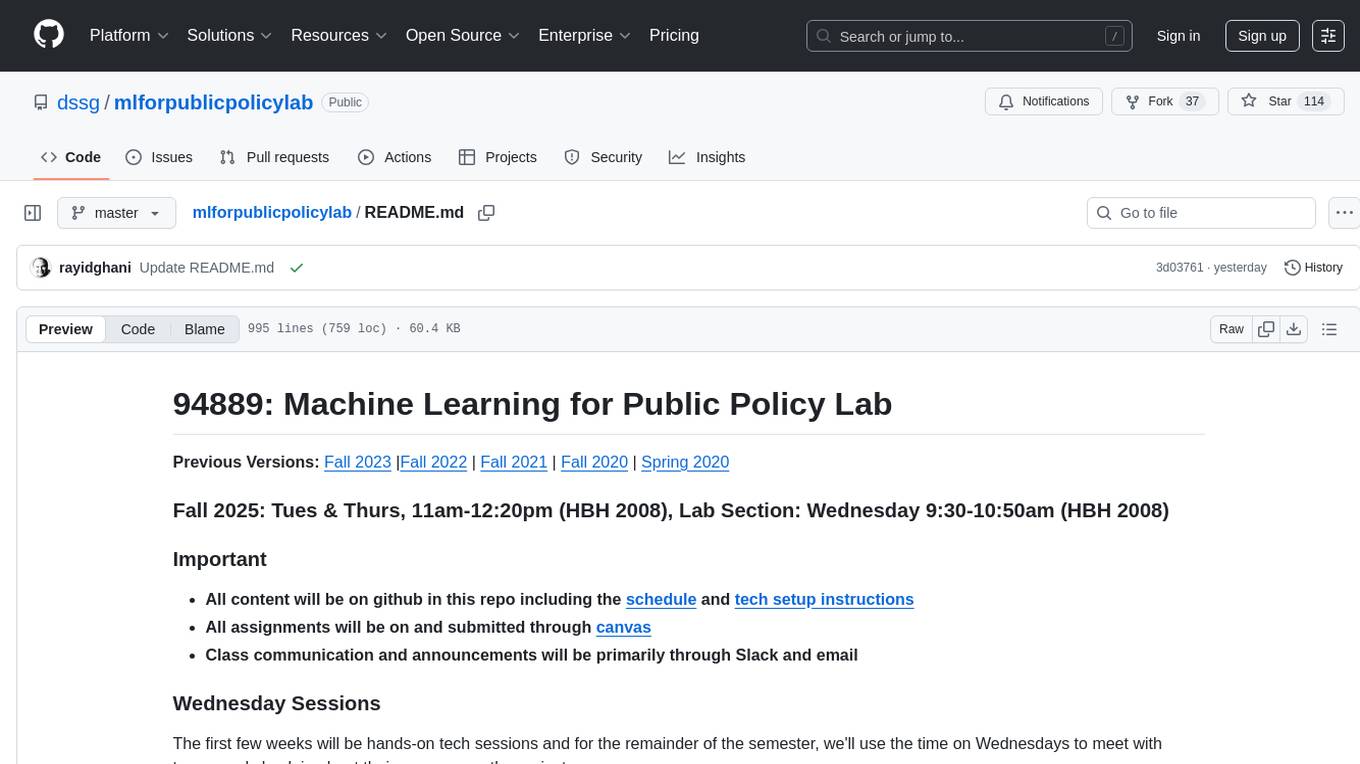
mlforpublicpolicylab
The Machine Learning for Public Policy Lab is a project-based course focused on solving real-world problems using machine learning in the context of public policy and social good. Students will gain hands-on experience building end-to-end machine learning systems, developing skills in problem formulation, working with messy data, communicating with non-technical stakeholders, model interpretability, and understanding algorithmic bias & disparities. The course covers topics such as project scoping, data acquisition, feature engineering, model evaluation, bias and fairness, and model interpretability. Students will work in small groups on policy projects, with graded components including project proposals, presentations, and final reports.
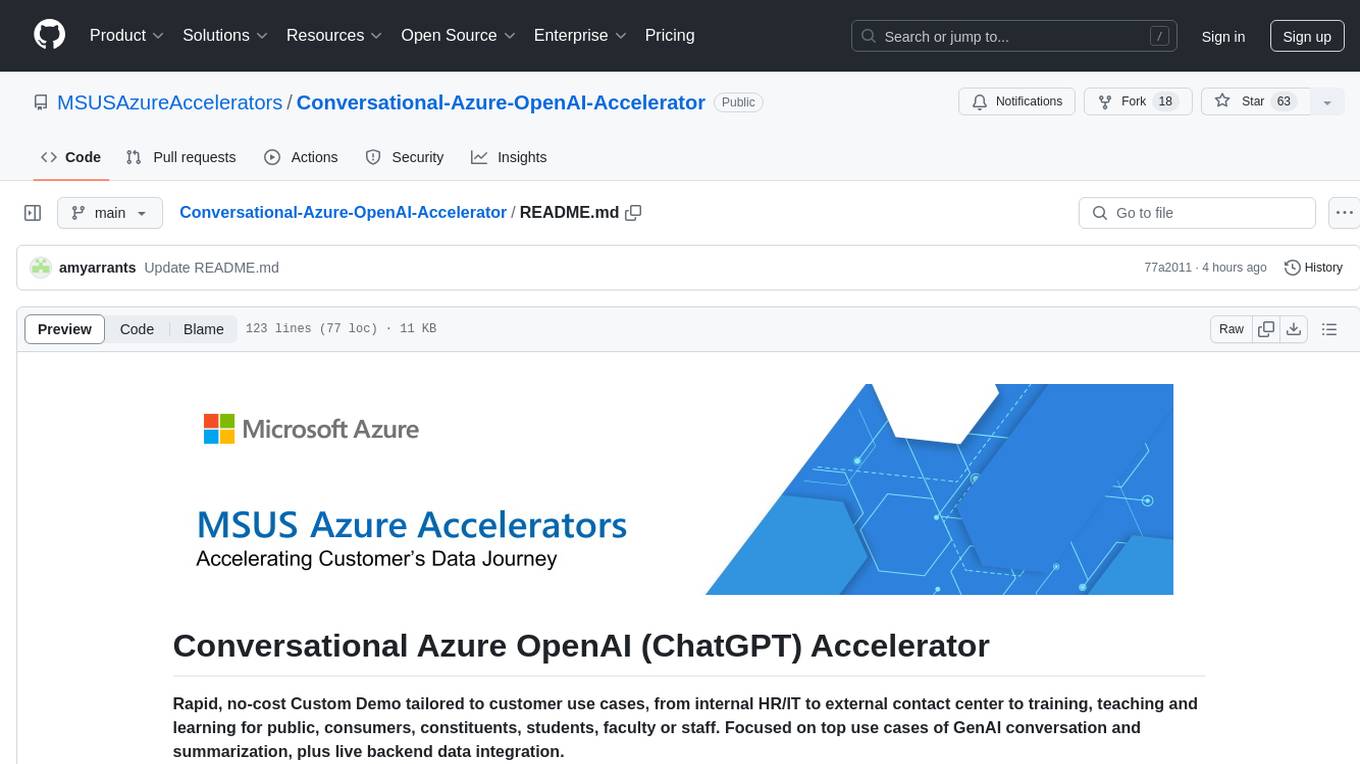
Conversational-Azure-OpenAI-Accelerator
The Conversational Azure OpenAI Accelerator is a tool designed to provide rapid, no-cost custom demos tailored to customer use cases, from internal HR/IT to external contact centers. It focuses on top use cases of GenAI conversation and summarization, plus live backend data integration. The tool automates conversations across voice and text channels, providing a valuable way to save money and improve customer and employee experience. By combining Azure OpenAI + Cognitive Search, users can efficiently deploy a ChatGPT experience using web pages, knowledge base articles, and data sources. The tool enables simultaneous deployment of conversational content to chatbots, IVR, voice assistants, and more in one click, eliminating the need for in-depth IT involvement. It leverages Microsoft's advanced AI technologies, resulting in a conversational experience that can converse in human-like dialogue, respond intelligently, and capture content for omni-channel unified analytics.
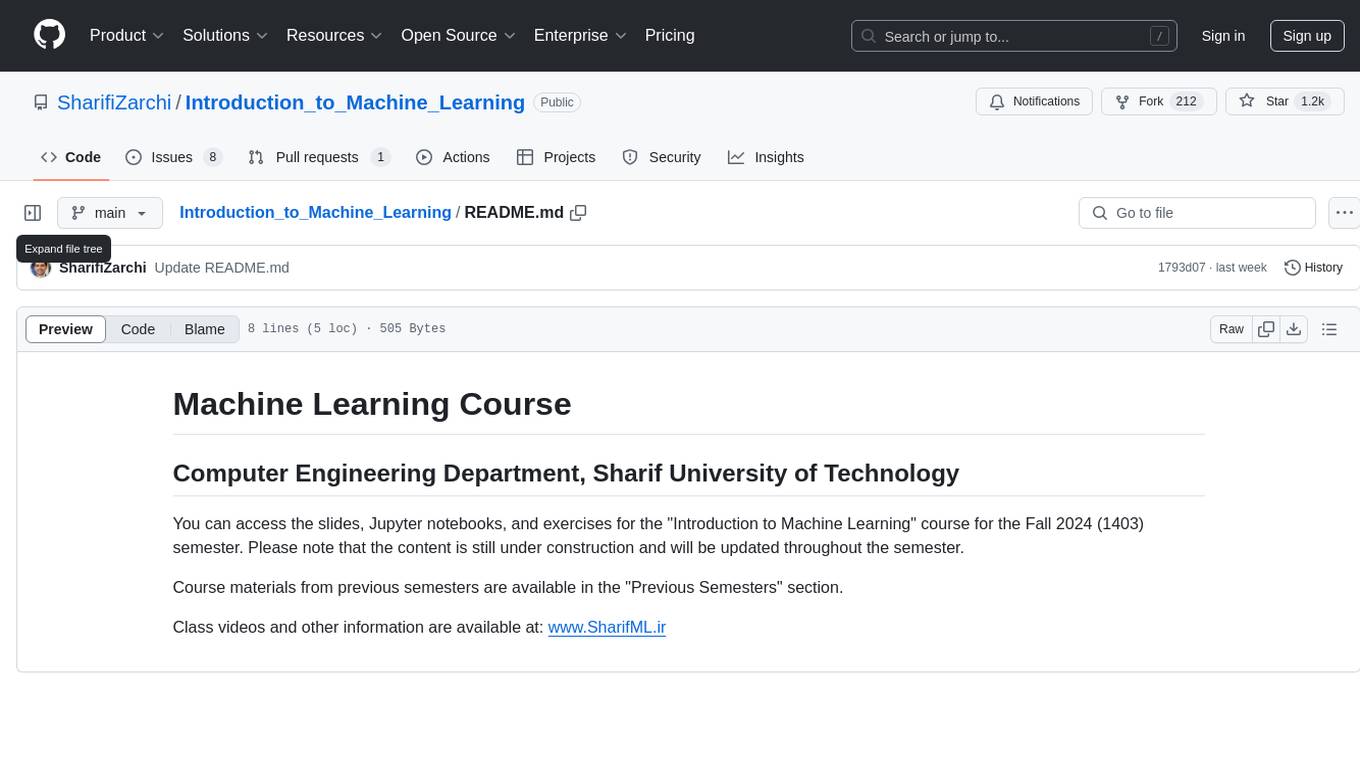
Introduction_to_Machine_Learning
This repository contains course materials for the 'Introduction to Machine Learning' course at Sharif University of Technology. It includes slides, Jupyter notebooks, and exercises for the Fall 2024 semester. The content is continuously updated throughout the semester. Previous semester materials are also accessible. Visit www.SharifML.ir for class videos and additional information.
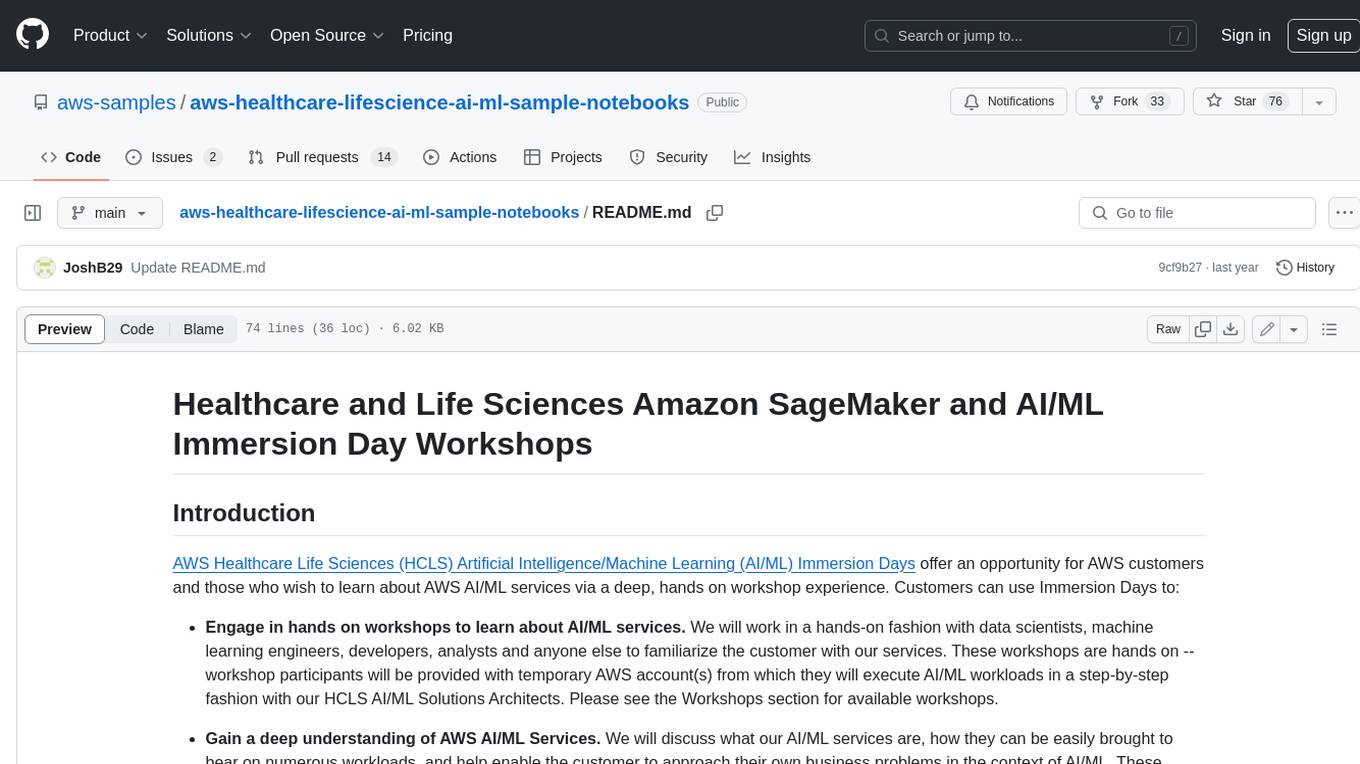
aws-healthcare-lifescience-ai-ml-sample-notebooks
The AWS Healthcare and Life Sciences AI/ML Immersion Day workshops provide hands-on experience for customers to learn about AI/ML services, gain a deep understanding of AWS AI/ML services, and understand best practices for using AI/ML in the context of HCLS applications. The workshops cater to individuals at all levels, from machine learning experts to developers and managers, and cover topics such as training, testing, MLOps, deployment practices, and software development life cycle in the context of AI/ML. The repository contains notebooks that can be used in AWS Instructure-Led Labs or self-paced labs, offering a comprehensive learning experience for integrating AI/ML into applications.
For similar tasks

Azure-Analytics-and-AI-Engagement
The Azure-Analytics-and-AI-Engagement repository provides packaged Industry Scenario DREAM Demos with ARM templates (Containing a demo web application, Power BI reports, Synapse resources, AML Notebooks etc.) that can be deployed in a customer’s subscription using the CAPE tool within a matter of few hours. Partners can also deploy DREAM Demos in their own subscriptions using DPoC.

sorrentum
Sorrentum is an open-source project that aims to combine open-source development, startups, and brilliant students to build machine learning, AI, and Web3 / DeFi protocols geared towards finance and economics. The project provides opportunities for internships, research assistantships, and development grants, as well as the chance to work on cutting-edge problems, learn about startups, write academic papers, and get internships and full-time positions at companies working on Sorrentum applications.

tidb
TiDB is an open-source distributed SQL database that supports Hybrid Transactional and Analytical Processing (HTAP) workloads. It is MySQL compatible and features horizontal scalability, strong consistency, and high availability.

zep-python
Zep is an open-source platform for building and deploying large language model (LLM) applications. It provides a suite of tools and services that make it easy to integrate LLMs into your applications, including chat history memory, embedding, vector search, and data enrichment. Zep is designed to be scalable, reliable, and easy to use, making it a great choice for developers who want to build LLM-powered applications quickly and easily.

telemetry-airflow
This repository codifies the Airflow cluster that is deployed at workflow.telemetry.mozilla.org (behind SSO) and commonly referred to as "WTMO" or simply "Airflow". Some links relevant to users and developers of WTMO: * The `dags` directory in this repository contains some custom DAG definitions * Many of the DAGs registered with WTMO don't live in this repository, but are instead generated from ETL task definitions in bigquery-etl * The Data SRE team maintains a WTMO Developer Guide (behind SSO)

mojo
Mojo is a new programming language that bridges the gap between research and production by combining Python syntax and ecosystem with systems programming and metaprogramming features. Mojo is still young, but it is designed to become a superset of Python over time.

pandas-ai
PandasAI is a Python library that makes it easy to ask questions to your data in natural language. It helps you to explore, clean, and analyze your data using generative AI.

databend
Databend is an open-source cloud data warehouse that serves as a cost-effective alternative to Snowflake. With its focus on fast query execution and data ingestion, it's designed for complex analysis of the world's largest datasets.
For similar jobs

NanoLLM
NanoLLM is a tool designed for optimized local inference for Large Language Models (LLMs) using HuggingFace-like APIs. It supports quantization, vision/language models, multimodal agents, speech, vector DB, and RAG. The tool aims to provide efficient and effective processing for LLMs on local devices, enhancing performance and usability for various AI applications.

mslearn-ai-fundamentals
This repository contains materials for the Microsoft Learn AI Fundamentals module. It covers the basics of artificial intelligence, machine learning, and data science. The content includes hands-on labs, interactive learning modules, and assessments to help learners understand key concepts and techniques in AI. Whether you are new to AI or looking to expand your knowledge, this module provides a comprehensive introduction to the fundamentals of AI.

awesome-ai-tools
Awesome AI Tools is a curated list of popular tools and resources for artificial intelligence enthusiasts. It includes a wide range of tools such as machine learning libraries, deep learning frameworks, data visualization tools, and natural language processing resources. Whether you are a beginner or an experienced AI practitioner, this repository aims to provide you with a comprehensive collection of tools to enhance your AI projects and research. Explore the list to discover new tools, stay updated with the latest advancements in AI technology, and find the right resources to support your AI endeavors.
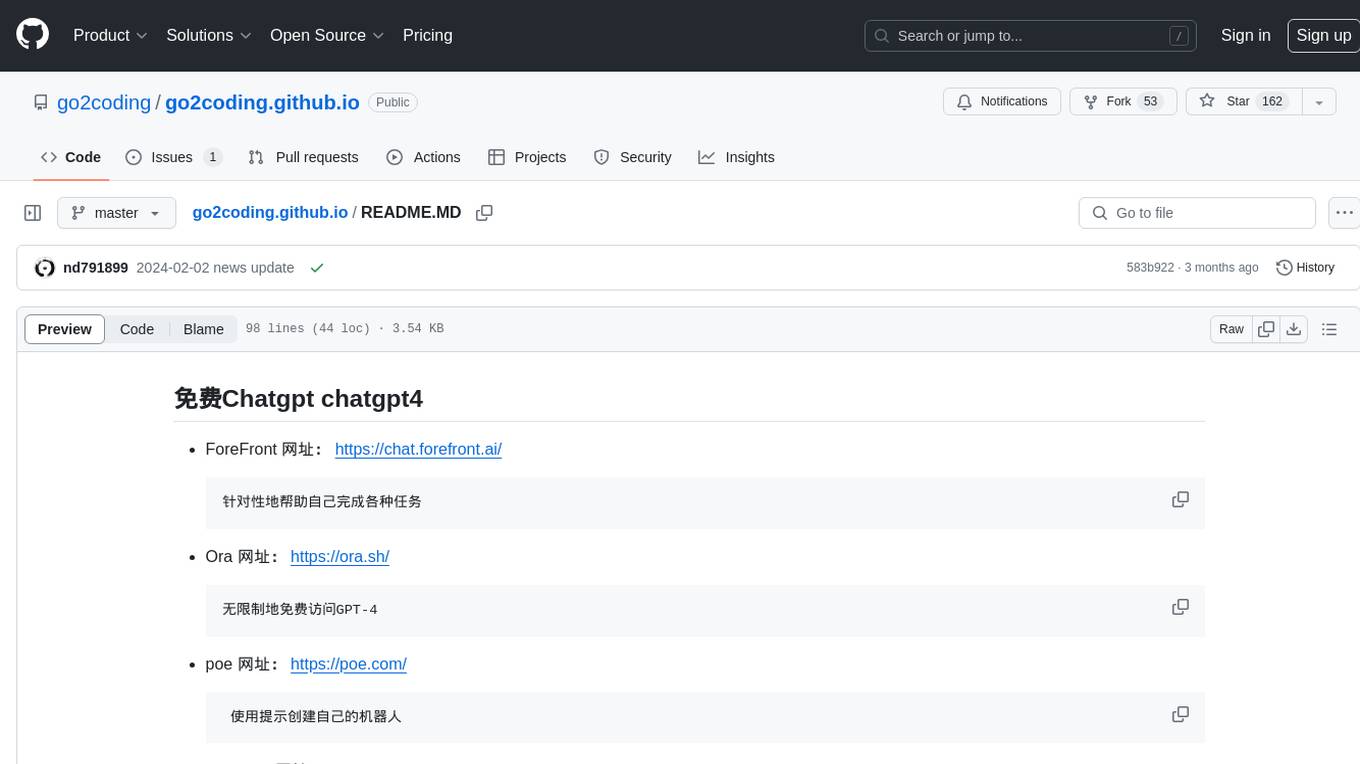
go2coding.github.io
The go2coding.github.io repository is a collection of resources for AI enthusiasts, providing information on AI products, open-source projects, AI learning websites, and AI learning frameworks. It aims to help users stay updated on industry trends, learn from community projects, access learning resources, and understand and choose AI frameworks. The repository also includes instructions for local and external deployment of the project as a static website, with details on domain registration, hosting services, uploading static web pages, configuring domain resolution, and a visual guide to the AI tool navigation website. Additionally, it offers a platform for AI knowledge exchange through a QQ group and promotes AI tools through a WeChat public account.
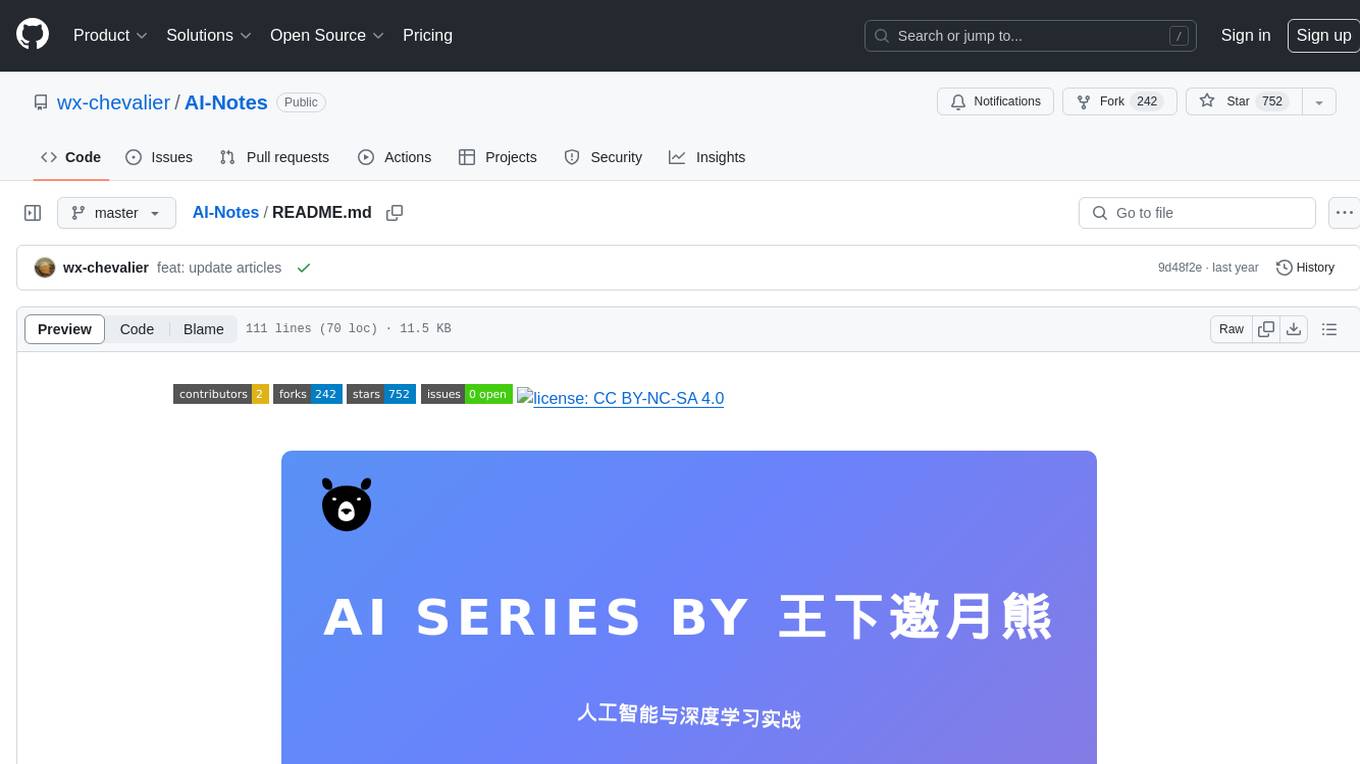
AI-Notes
AI-Notes is a repository dedicated to practical applications of artificial intelligence and deep learning. It covers concepts such as data mining, machine learning, natural language processing, and AI. The repository contains Jupyter Notebook examples for hands-on learning and experimentation. It explores the development stages of AI, from narrow artificial intelligence to general artificial intelligence and superintelligence. The content delves into machine learning algorithms, deep learning techniques, and the impact of AI on various industries like autonomous driving and healthcare. The repository aims to provide a comprehensive understanding of AI technologies and their real-world applications.
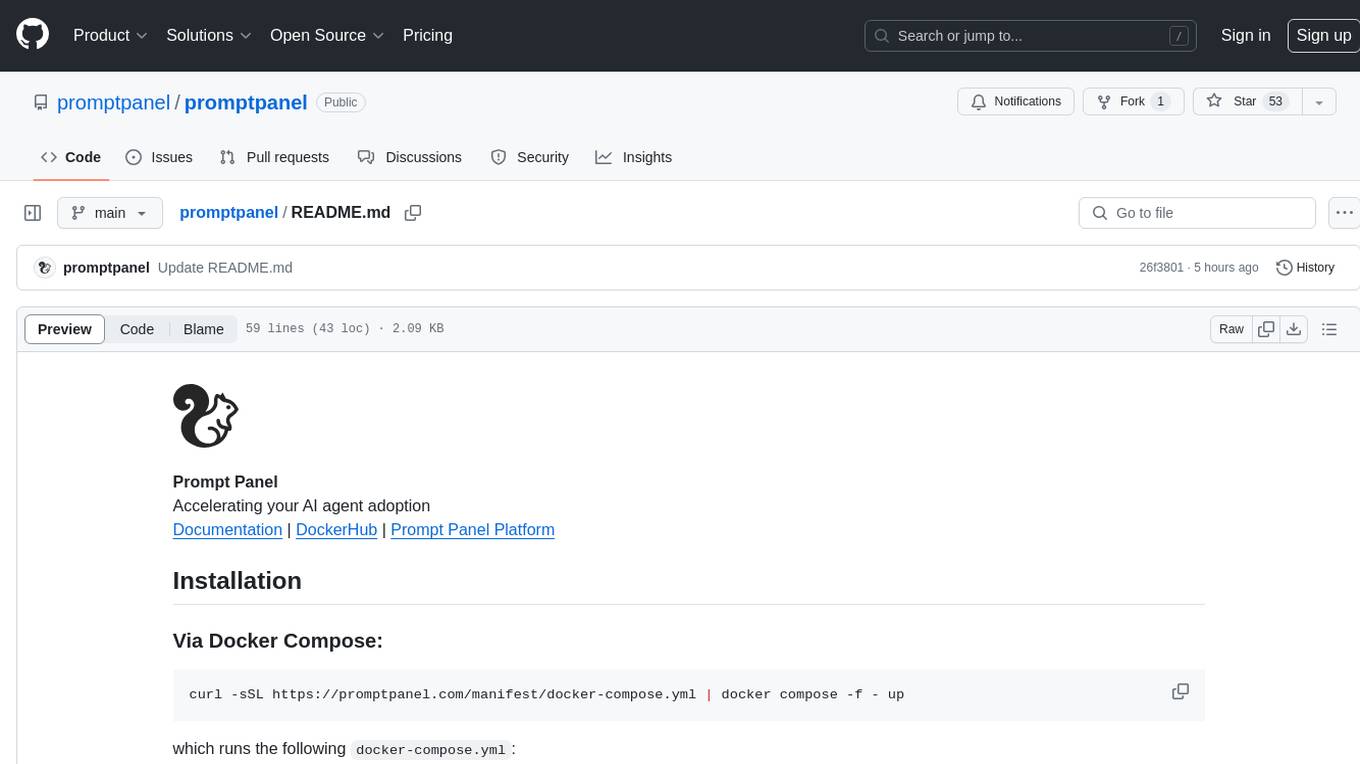
promptpanel
Prompt Panel is a tool designed to accelerate the adoption of AI agents by providing a platform where users can run large language models across any inference provider, create custom agent plugins, and use their own data safely. The tool allows users to break free from walled-gardens and have full control over their models, conversations, and logic. With Prompt Panel, users can pair their data with any language model, online or offline, and customize the system to meet their unique business needs without any restrictions.
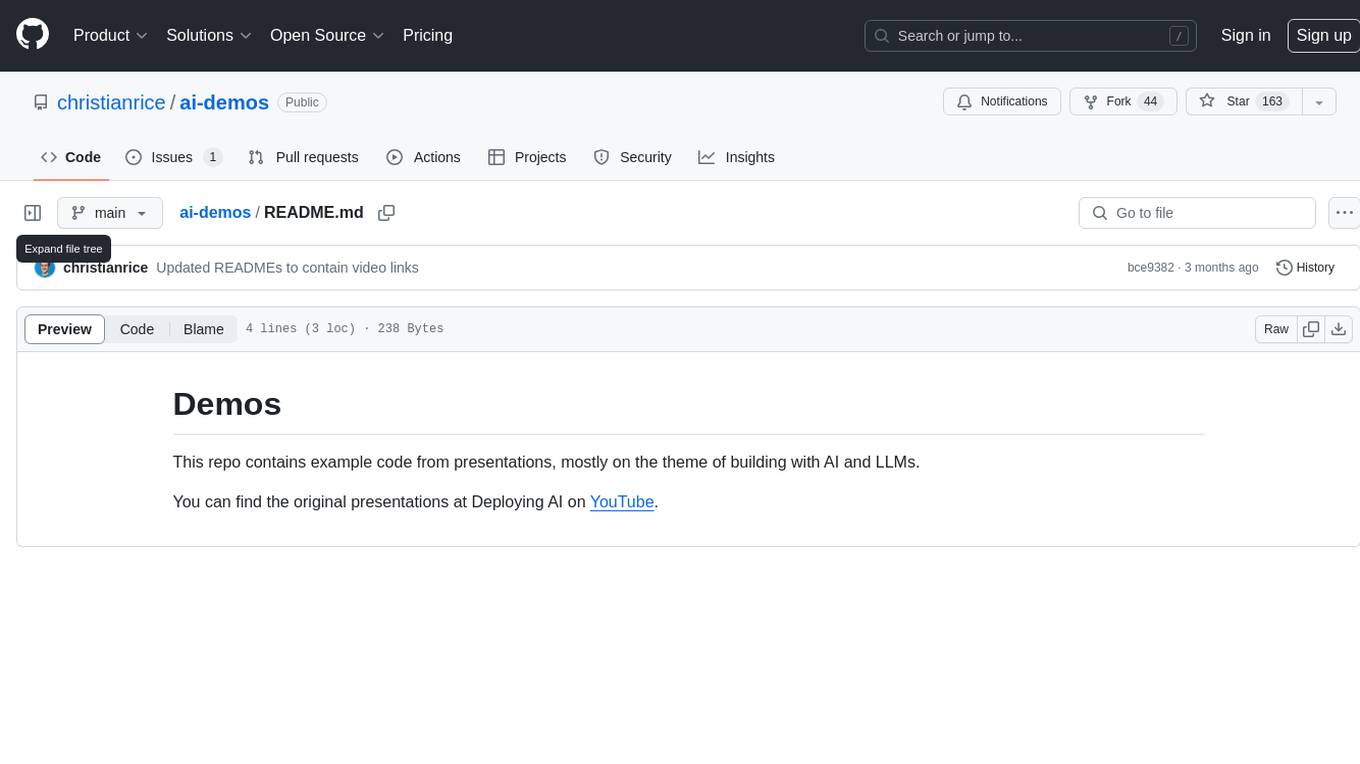
ai-demos
The 'ai-demos' repository is a collection of example code from presentations focusing on building with AI and LLMs. It serves as a resource for developers looking to explore practical applications of artificial intelligence in their projects. The code snippets showcase various techniques and approaches to leverage AI technologies effectively. The repository aims to inspire and educate developers on integrating AI solutions into their applications.
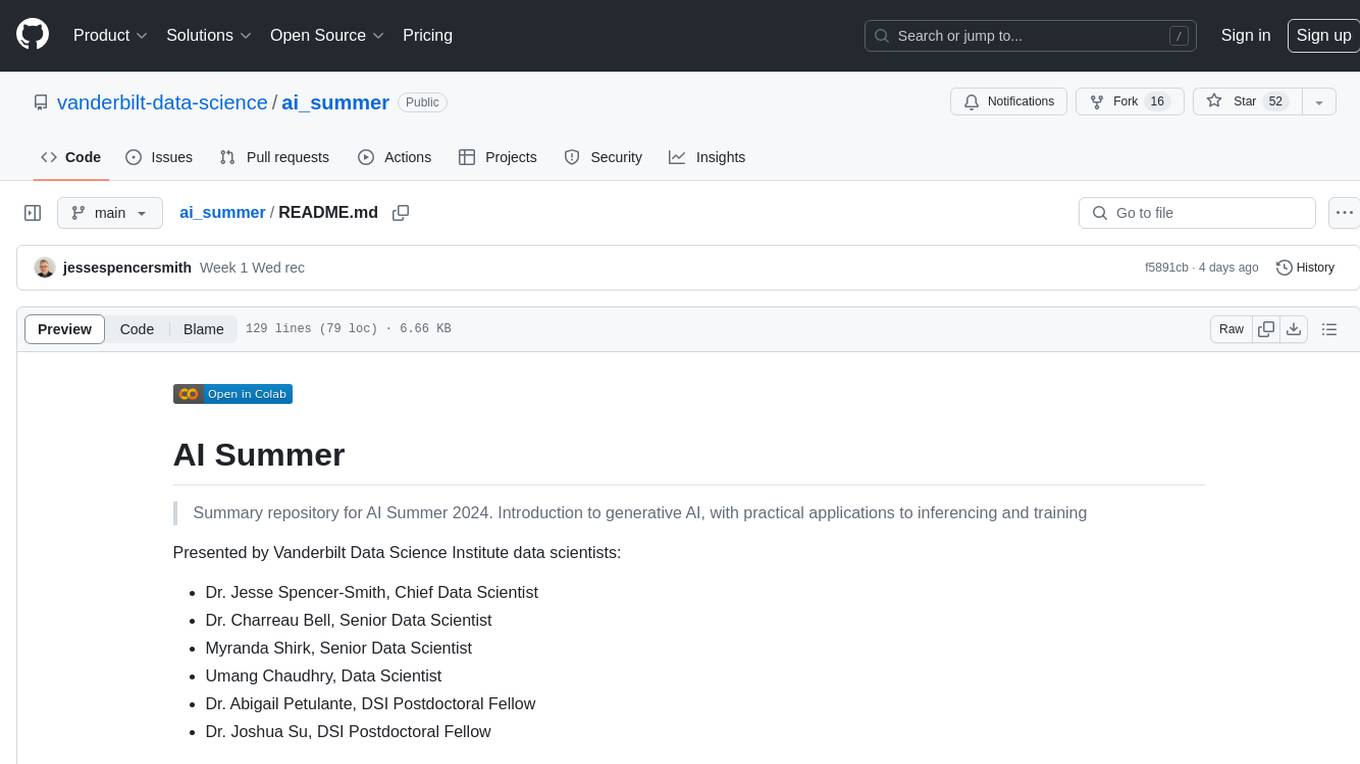
ai_summer
AI Summer is a repository focused on providing workshops and resources for developing foundational skills in generative AI models and transformer models. The repository offers practical applications for inferencing and training, with a specific emphasis on understanding and utilizing advanced AI chat models like BingGPT. Participants are encouraged to engage in interactive programming environments, decide on projects to work on, and actively participate in discussions and breakout rooms. The workshops cover topics such as generative AI models, retrieval-augmented generation, building AI solutions, and fine-tuning models. The goal is to equip individuals with the necessary skills to work with AI technologies effectively and securely, both locally and in the cloud.